Essential Guide to Veterinary Care for Rabbits
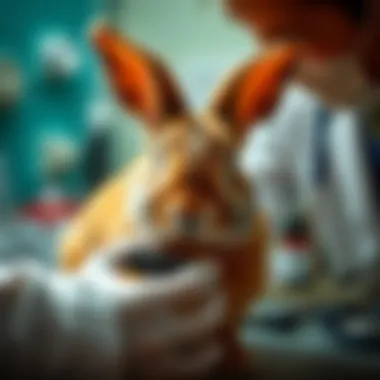
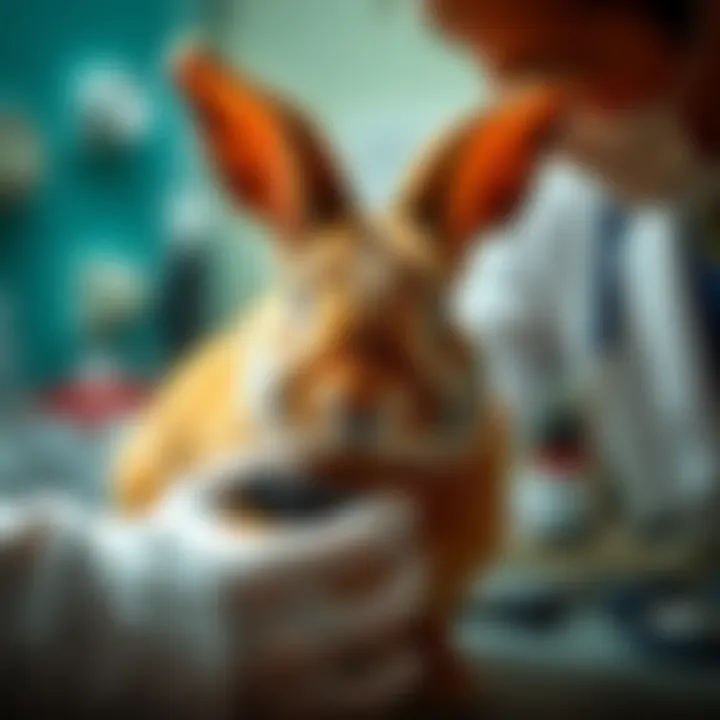
Intro
Caring for a pet rabbit is much like nurturing any other beloved companion. Yet, bunnies are unique creatures with their own set of needs and concerns, deserving careful attention. This guide is a roadmap for pet owners, unraveling the essentials of veterinary care tailored specifically to our furry friends. From understanding their behavior to coping with health issues, this guide aims to equip bunny parents with robust knowledge to ensure their pets flourish.
Understanding Your Pet
Rabbits are known for their gentle temperament and playful nature. However, the complexities of their behavior and health should not be underestimated. To enhance your bond with your pet, it's crucial to grasp the underlying principles of rabbit behavior and specific needs.
Pet Behavior Basics
It’s important to recognize that rabbits are social animals. They thrive in environments where they can interact, both with humans and their kind. Their language can be subtle, often conveyed through body posture, ear position, and even little thumps with their back legs. Ignoring these signals might lead to misunderstandings, affecting their well-being.
Common Breed Characteristics
Different breeds have tailored needs and personalities. For instance, larger breeds like the Flemish Giant may not adopt the same lifestyle as a more active breed like the Holland Lop. Familiarizing yourself with your bunny's breed can help anticipate its specific requirements, shedding light on everything from exercise to social interactions.
Species-Specific Needs
Bunnies require a diet that reflects their herbivore status. Hay should be the staple of their diet, providing essential fiber. Additionally, fresh greens and a limited amount of pellets complete their nutritional needs. To top it off, fresh water must always be accessible.
Pet Care and Maintenance
Ensuring that your bunny receives adequate care demands an understanding of their basic needs, from diet to hygiene practices. Small steps can lead to a significant improvement in their health and happiness.
Feeding Guidelines
Feeding rabbits can seem straightforward, yet many owners fall into common traps, like over-relying on pellets or neglecting hay. It’s vital to introduce a balanced diet; ideally, hay should occupy the bulk of what they consume. Dark leafy greens—like romaine lettuce, parsley, or basil—provide added hydration and nutrients. Be sure to avoid starchy veggies like carrots, which can lead to obesity.
Grooming Essentials
Depending on the breed, grooming can vary significantly. Long-haired rabbits may need more regular grooming to prevent matting, while their short-haired companions may need occasional brushing at most. Additionally, trimming their nails is an important task that helps prevent potential injuries and promotes comfort.
Hygiene Practices
Maintaining cleanliness in a rabbit’s environment is vital. Their litter boxes need to be cleaned regularly, and their living space should also be tidied daily to avoid unpleasant odors and potential health problems.
Training and Development
Training your rabbit is not just about commands; it’s about understanding your pet and nurturing its natural instincts. Bunnies can learn and adapt, sometimes even surprising their owners.
Basic Commands and Skills
Just like a dog, a rabbit can learn fundamental commands, such as "come" or "stay." Short training sessions, rich in positive reinforcement, tend to yield the best results.
Behavioral Training Techniques
Patience is key. Using gentle encouragement and rewards helps instill good habits. It’s important not to use negative reinforcement; a bunny's trusting nature can easily be shaken.
Addressing Common Behavior Issues
Troublesome behaviors like chewing furniture or neutering accidents can arise. Identifying the root cause often leads to simple solutions. Engaging your bunny in playtime or providing a variety of chew toys may curb destructive tendencies.
Health and Wellness
Monitoring your bunny’s health can seem daunting, but regular checks can catch issues before they escalate.
Routine Vet Check-ups
Scheduling routine visits to a specialized vet is crucial. These check-ups help in tracking your bunny’s growth and overall health status.
Vaccination Needs
Vaccination against common diseases like myxomatosis and viral hemorrhagic disease (VHD) is vital, especially in regions where these threats are prevalent.
Recognizing Signs of Illness
Rabbits are masters at hiding pain. Watch for subtle changes like altered eating habits, lethargy, or changes in stool consistency. Observing these signs can lead to timely interventions.
Enrichment and Activities
A mentally engaged rabbit is a happy rabbit. Creating an enriched environment is essential for their well-being.
Indoor vs. Outdoor Activities
Both environments offer unique benefits. Indoor play can be controlled, keeping your bunny safe from predators and harsh weather. Outdoor time under supervision allows bunnies to explore the grass and experience natural sunlight.
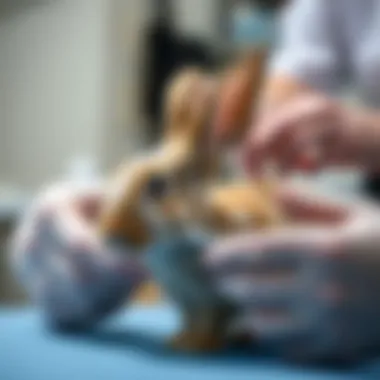
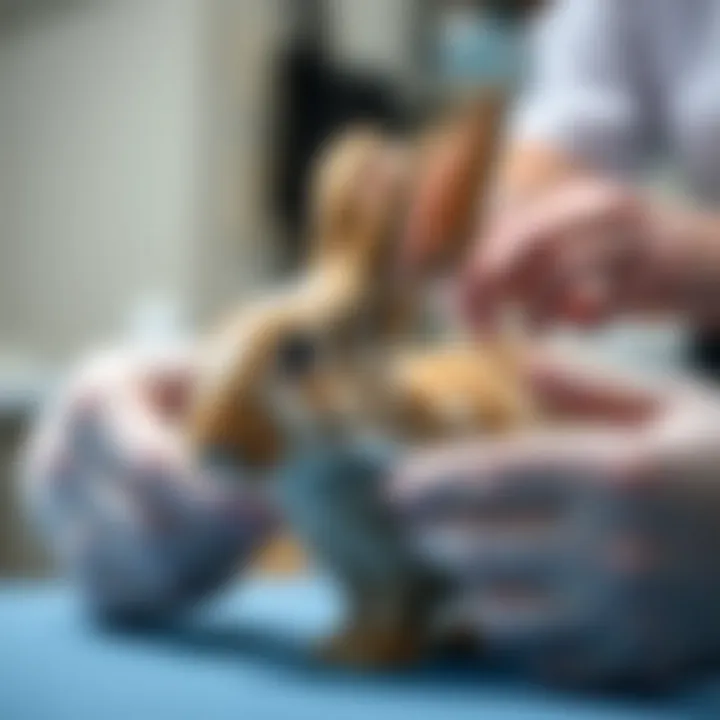
Interactive Toys and Games
Offering toys that stimulate their minds encourages natural behaviors, reducing boredom. Chewing blocks, tunnels, and puzzle toys can keep them entertained for hours.
Socialization Opportunities
Bunnies often thrive in social settings. Introductions to other pets, humans, or even friend rabbits can boost their confidence and emotional well-being. Just remember to supervise interactions to keep everyone safe and happy.
"A well-cared-for rabbit can bring unfathomable joy to a home, making them more than just pets but cherished family members."
For further insights and community support, consider visiting resources like Wikipedia on Rabbit Care or Britannica. You can also explore discussions on rabbit care at Reddit or check local veterinary practices on Facebook.
Intro to Veterinary Needs for Bunnies
Caring for a rabbit goes far beyond just providing food and shelter. Understanding the specific veterinary needs of these gentle creatures is essential in promoting their health and longevity. Rabbits have unique physiological and behavioral traits that set them apart from other household pets. This makes a deeper dig into their veterinary care crucial for any responsible pet owner.
A big part of bunny care involves recognizing that their health can quickly take a turn for the worse. They are prey animals, meaning their instinct is to hide signs of illness. Thus, owners may not notice it until the situation becomes critical. Knowing the specific need for veterinary intervention can vastly improve the chances of a great outcome.
In this section, we will cover two main aspects:
- Understanding the Unique Physiology of Rabbits: Explore how their anatomy and physiology differ from other small animals.
- The Role of Veterinary Care in Rabbit Health: Discuss why regular veterinary visits are not just beneficial, but necessary for bunnies.
"Preventive care is the best medicine. By catching issues early, you can avoid the heartache of losing a loved one too soon."
By diving into these elements, pet owners can fully grasp the importance of veterinary care and ensure their little furballs live happy, healthy lives. Being proactive about their health care needs can also lead to a more fulfilling bond between the pet and owner, as well as peace of mind knowing you’re doing your utmost for your bunny’s well-being.
Understanding the Unique Physiology of Rabbits
Rabbits are unique creatures. Unlike dogs or cats, their anatomy is specifically designed for survival in the wild. They possess large, sensitive ears and strong hind legs, allowing them to contract quickly from predators. But this distinct physiology also plays a substantial role in how they handle health issues. For example, their digestive system is incredibly delicate. A rabbit's intestines are designed to be continually moving; any disruption can quickly lead to serious problems like GI stasis. Additionally, their teeth grow continuously throughout their lives, requiring specialized dental care.
Understanding these unique characteristics makes it easier for owners to identify what constitutes a normal state for their rabbits. Moreover, awareness of their physiology informs pet owners about the importance of routine check-ups, as specific conditions can arise more rapidly than one might predict.
The Role of Veterinary Care in Rabbit Health
Most people think of veterinary care as something you do when an animal is visibly sick. However, when it comes to rabbits, regular vet visits can mean the difference between life and death. Veterinary care plays a multimodal role in rabbit health:
- Preventive Healthcare: Regular assessments help spot potential health risks before they develop into larger problems.
- Vaccinations: Bunnies are susceptible to certain contagious diseases, and vaccination can save their lives.
- Dental Checks: Given their continuously growing teeth, veterinary care is essential in preventing dental-related issues that can lead to complications like abscesses or severe discomfort.
This type of care isn’t just about treating ailments; it’s about keeping your rabbit thriving. Knowing when to visit the vet can mean the difference between a treatable condition and a serious medical crisis. Take the proactive approach—because when it comes to your bunny's health, an ounce of prevention truly is worth a pound of cure.
Choosing a Veterinarian for Your Rabbit
Choosing the right veterinarian for a rabbit is not just a matter of convenience; it is a crucial decision that directly impacts the health and well-being of your furry companion. Unlike more common pets like cats or dogs, rabbits have unique physiological and health needs that require specialized knowledge and experience. Thus, finding a veterinarian who understands these peculiarities becomes paramount. It's about making sure your bunny gets the best possible care tailored specifically to their needs.
Having a knowledgeable veterinarian can significantly influence the longevity and quality of life for your rabbit. As such, many pet owners might wonder how to ensure they are selecting the right professional. Below we delve into key considerations that can aid in this selection process, providing a sense of assurance and clarity when it comes to your furry friend's healthcare.
Identifying a Veterinarian with Rabbit Expertise
When seeking medical care for your rabbit, the first thing to look for is expertise in treating rabbits. Not all veterinarians are equipped with the specialized training that rabbits require. Ask about their experience specifically with small mammals or – even better – rabbits. A good starting point is to check for certification from recognized professional bodies such as the Association of Exotic Mammal Veterinarians or the House Rabbit Society.
Here are some actionable steps to identify the right veterinarian:
- Ask for Recommendations: Reach out to local rabbit owners or communities online, such as those on Reddit or Facebook. Personal experiences shared by other pet owners can lead you to reputable vets.
- Inquire About Services: Call the clinic and ask if they provide services dedicated to rabbits, including spaying, neutering, and dental health assessments.
- Visit Their Website: Look for any information on their specialties. It often highlights their commitment to understanding rabbit care.
Finding a veterinarian who not only treats rabbits but specializes in them can ease your mind. An expert will recognize symptoms that less knowledgeable vets may miss, ensuring your bunny receives timely and appropriate treatment.
Evaluating Veterinary Facilities and Services
After narrowing down your options to experts in rabbit care, the next step involves evaluating the facilities and services they offer. Taking a closer look at the environment where your bunny will receive treatment can be quite telling about the quality of care.
Key aspects to consider include:
- Cleanliness and Organization: Visit the clinic if possible. A clean and well-organized facility is often a good sign of the care and attention given to all pets.
- Staff Attitude: Observe how the staff interacts with rabbits and their owners. A friendly, knowledgeable staff which shows respect for animals can indicate a practice that prioritizes pet welfare.
- Emergency Services: Inquire if they offer emergency services or have an arrangement with nearby clinics for urgent situations. This type of setup can be beneficial in times of crisis.
- Client Education: A vet should be willing to educate pet owners about rabbit care, nutrition, and preventative health. This is crucial, as informing you empowers better decision-making for your bunny’s health.
When you evaluate these aspects, you equip yourself with the knowledge necessary to make an informed choice for your rabbit’s care, ensuring they receive the high-standard veterinary attention they deserve.
"A vet who cares is worth their weight in carrots."
Selecting a veterinarian for your rabbit is not merely a checklist affair; it's about forming a relationship that will benefit both you and your fluffy companion throughout their life.
Preventive Care Practices
Preventive care practices are essential in ensuring the overall health and well-being of pet rabbits. Much like with any family member, keeping an eye on your bunny's health from the get-go can save you and your rabbit from unnecessary heartaches down the line. These practices encompass regular veterinary visits, vaccination schedules, dental examinations, and dietary considerations. They not only enhance the quality of life but also extend the lifespan of these furry friends.
Routine Health Checks: What to Expect
When you schedule a routine health check for your bun, it’s more than just a simple check-up. Your veterinarian will typically conduct a thorough physical examination. This includes checking the eyes, ears, nose, and teeth, as well as palpating the abdomen to feel for any abnormalities. You can expect to discuss your rabbit's diet, behavior, and changes in habits since the last visit.


During these visits, your vet might ask questions like:
- Is your rabbit eating and drinking normally?
- Have you noticed any changes in behavior or activity levels?
- Are there any signs of discomfort, like tooth grinding or lethargy?
"Regular check-ups are key for catching problems early before they turn into big issues".
In essence, these health checks set the stage for proactive care. Early detection of issues can mean simpler and less invasive treatments.
Understanding Vaccination Protocols
Vaccination is a cornerstone of preventive healthcare for rabbits. Although rabbits are not as commonly vaccinated as dogs or cats, they are still vulnerable to several serious diseases. Vaccines for myxomatosis and viral hemorrhagic disease (VHD) are particularly important. The specific vaccination schedule can vary depending on where you live and your rabbit's lifestyle.
It's crucial to talk with your vet to determine the right timing for vaccinations. Typically, young rabbits might receive their first vaccinations around the age of 8 weeks, followed by booster shots. Staying on top of these vaccinations helps ensure that your bunny is not just healthy today, but protected for the future too.
Dental Care for Rabbits
Rabbit dental care is an often-overlooked aspect of preventive health. Unlike us, rabbits' teeth continuously grow throughout their lives. Proper dental care is vital to prevent tooth overgrowth, abscesses, or misalignment, all of which can lead to severe health problems. Regular check-ups will often include an inspection of your rabbit's teeth.
You might want to incorporate hay into their daily diet, as it not only provides essential fiber but also helps wear down their teeth naturally. Signs of dental issues include:
- Difficulty eating or chewing
- Excessive drooling
- Foul breath
- Swelling around the mouth
Visiting a vet who specializes in rabbits is the best way to ensure your bunny's dental health.
In sum, preventive care practices encompass a holistic approach to rabbit ownership. Adopting these measures not only enhances the quality of life for your furry companion but also fortifies the bond between you and your pet.
For more information on rabbit care, visit The House Rabbit Society or refer to resources from American Veterinary Medical Association.
Regularly consult with your veterinarian about the best practices for your bunny's health. Each rabbit is unique, and having tailored care will undoubtedly give your pet the happiest, healthiest life possible.
Common Health Issues in Rabbits
Understanding the most common health issues in rabbits is crucial for any bunny owner. Rabbits are unique creatures with specific health needs that can sometimes slip under the radar. When left unaddressed, common health problems can escalate quickly, impacting not only the rabbit's quality of life but also their lifespan. Awareness and early detection are vital in ensuring our furry friends lead long, happy lives.
Gastrointestinal Problems: Prevention and Treatment
Gastrointestinal issues are often at the forefront when discussing common health problems in rabbits. These critters have a highly specialized digestive system, and even minor changes in diet or environment can lead to serious consequences. A rabbit’s digestive tract is designed to handle fibrous food, so a lack of hay can result in issues like stasis, where the intestines slow down or stop altogether.
Prevention measures include:
- Providing unlimited access to high-quality hay, which is essential for digestion.
- Implementing a gradual change in diet if introducing new foods.
- Maintaining a consistent routine to avoid stress, which can be a contributing factor to GI problems.
If a rabbit shows signs of pain, such as a hunched posture or reluctance to eat, immediate veterinary consultation is crucial. Treatment often requires supportive care, which may involve fluids and pain management. In some cases, surgery may be necessary, but early intervention can often prevent this.
Respiratory Infections: Signs and Solutions
Respiratory infections are unfortunately common among rabbits and can manifest rapidly. Recognizing the signs early is vital. Symptoms such as sneezing, runny nose, or labored breathing should always be taken seriously. A rabbit's fragile respiratory system can be compromised by environmental factors such as dusty bedding or drafts.
Here’s how to handle respiratory issues:
- If you observe any symptoms, don’t wait around. Consult a veterinarian promptly for a proper diagnosis.
- Keep their environment clean to reduce irritants.
- Ensure proper ventilation but avoid cold drafts, as that can exacerbate existing conditions.
Treatment often involves antibiotics when a bacterial infection is suspected. However, it’s essential to follow a vet’s guidance and not self-medicate, as this can lead to complications.
Skin Conditions and Parasites
Skin problems and parasites can significantly affect a rabbit’s health and comfort. Common skin conditions may arise due to poor grooming or environmental irritants. Mites, for instance, are particularly troublesome and can lead to severe itching and discomfort.
To avert these issues:
- Regularly check your bunny’s coat and skin for any inconsistencies, such as bald patches or crusty spots.
- Maintain a clean living environment to reduce the risk of parasitic infestations.
- Ensure they are groomed properly, especially if they have long fur.
If a skin issue arises, a veterinary visit is advisable to determine the cause and appropriate treatment. Depending on the diagnosis, solutions might include medicated shampoos or topical treatments.
"Regular vet check-ups and monitoring your rabbit's health can lead to early detection of these common health issues, ultimately ensuring a better quality of life for your furry friend."
In summary, being vigilant about your rabbit’s health can make a significant difference. Keeping an eye out for common health issues, understanding preventive care, and seeking professional help when necessary will lead to happier and healthier bunnies.
Nutritional Requirements for Bunnies
Understanding the nutritional needs of rabbits is a cornerstone of proper care. Many pet owners might overlook this critical aspect, thinking that any food will suffice. However, the right diet is paramount for the health and vitality of your bunny. Bunnies have a unique digestive system that requires a balance of fiber, vitamins, and minerals to keep them thriving. An optimal diet not only enhances their physical well-being but also supports their mental health, leading to a happier, more active pet.
Understanding a Balanced Diet for Rabbits
A balanced diet for rabbits should primarily consist of hay, fresh vegetables, and a limited number of pellets.
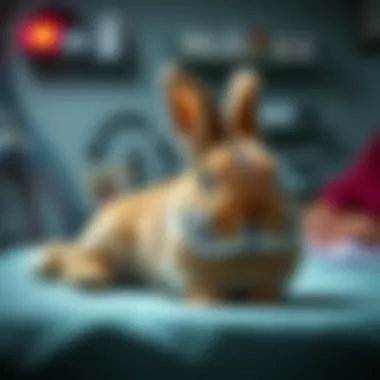
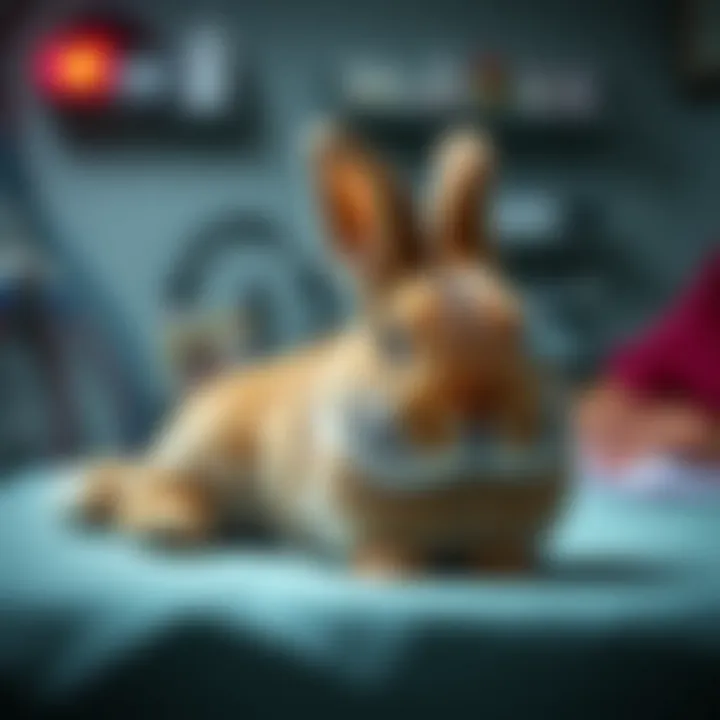
- Hay: Timothy hay or other grass hays should be the foundation of a rabbit's diet. Hay provides necessary fiber, which is crucial for healthy digestion and helps prevent gastrointestinal issues. Rabbits need constant access to hay.
- Fresh Vegetables: Dark, leafy greens should make up a significant part of a rabbit's diet. Kale, romaine lettuce, and parsley are excellent choices. Be sure to wash the vegetables clean to remove any pesticides or chemicals before serving.
- Pellets: Pellets should be given in moderation. Look for high-quality, timothy hay-based pellets that are designed for rabbits. These provide concentrated nutrients; however, overfeeding can lead to obesity and other health concerns.
- Fruits: Treats like apples or strawberries can be offered in small quantities. Often, it’s best to limit sugary treats and keep fruit consumption to just a couple of times a week.
A rabbit's diet can vary based on age, health status, and weight, which is why observing your bunny's condition after meals is essential. Monitoring their weight and stool can give insights on whether the diet is suitable.
Safe Foods and Toxic Substances
When feeding your rabbit, it’s just as essential to know what not to include in their diet. Certain foods can be harmful and should be avoided entirely.
Safe Foods:
- Leafy greens such as collard greens, bok choy, and cilantro can be part of a varied diet.
- Fresh herbs like basil, mint, and dill also provide additional nutrients.
- Carrots can be offered as an occasional treat due to their sugar content.
Toxic Foods:
- Avoid iceberg lettuce, as it has little nutritional value and can cause digestive distress.
- Foods high in starch and sugar, such as corn and bread, can lead to significant health issues.
- Fruits in excess can contribute to obesity, and some fruits like avocados are particularly toxic to rabbits.
It’s vital for rabbit owners to familiarize themselves with potentially harmful substances. Knowing them can make a world of difference in ensuring their wellness.
Remember: A proper diet isn't just about filling bowls; it’s about nurturing health and happiness. A well-fed bunny is a happy bunny, and paying close attention to their dietary needs fosters a bond built on trust and care.
For more detailed information on rabbit nutrition, you can explore resources like Rabbit.org or check out Wikipedia for general biological insights.
Behavioral Health Observations
Understanding the behavioral health of your bunny is just as crucial as addressing their physical needs. A rabbit’s behavior speaks volumes about their overall health, happiness, and well-being. By closely observing your pet, you can catch potential issues early or recognize when they are thriving. Not only does this insight ensure that your bunny leads a healthier life, but it also helps in deepening the bond you share with them.
Recognizing Signs of Stress or Illness
Rabbits are adept at hiding their discomfort; it's their natural instinct, a survival trait from the wild. This means as a pet owner, you have to play the detective. Here are a few signs that could indicate stress or illness:
- Changes in Eating Habits: If your rabbit suddenly stops eating or begins to eat less, it could be a sign of dental issues or gastrointestinal problems.
- Behavioral Changes: A normally active rabbit that suddenly seems lethargic, hiding or becoming overly aggressive might be unwell.
- Unusual Noises: Whining or honking can signal discomfort or distress. These vocalizations may indicate different issues, from stress to pain.
- Posture Changes: Hunched over, lying flat on the ground, or an arched back is not typical behavior and can signify pain.
When observing your rabbit, take note of these behaviors. A consistent change can tell you whether a visit to the vet is necessary. Noting any sudden shifts can help your veterinarian better diagnose underlying health conditions.
Creating a Stress-Free Environment
Making your bunny feel safe and comfortable in their environment can significantly reduce stress. Your home should be a haven for them. Consider these strategies to create a peaceful setting:
- Design an Ideal Space: Provide a spacious area with plenty of room to hop and explore. A cramped environment can lead to anxiety.
- Safe Hiding Places: Rabbits love to hide. Providing them with safe spaces, like boxes or tunnels, can give them the comfort they seek when feeling stressed.
- Consistent Routine: Try to keep a consistent schedule for feeding and handling. Rabbits thrive on routine and knowing what’s next can make them feel secure.
- Limit Loud Noises: Keep their living space quiet and calm. Loud noises from TV, radios, or even kids can cause anxiety.
A serene living atmosphere makes a world of difference in a bunny?s life. Try incorporating these elements into their environment right away, and you’ll likely see a happier, calmer, and more relaxed rabbit.
"A healthy bunny is a happy bunny. Ensure your pet's environment matches their need for security and comfort."
For further reading on rabbit behavior, you can explore resources from The House Rabbit Society or check out discussions on Reddit about rabbit care. Through these channels, you may find valuable insights and tips tailored by experienced rabbit owners.
Emergency Situations and First Aid
When it comes to our fluffy companions, understanding what to do in emergencies can be a matter of life and death. Bunnies can face a variety of sudden health issues, and being prepared is part of responsible pet ownership. Recognizing emergency situations and providing basic first aid can significantly improve your rabbit's chances of recovery. This part of the article dives into common emergencies involving rabbits and basic first aid techniques that any bunny owner should know.
Common Emergencies Affecting Rabbits
Rabbits are surprisingly fragile creatures, and several critical situations can arise unexpectedly. Here are some of the most common emergencies that rabbit owners may encounter:
- Gastrointestinal Stasis: This condition occurs when a rabbit’s digestive system slows down or stops altogether. Signs include loss of appetite, lethargy, and very small or no droppings. This issue is urgent because it can lead to serious complications quickly.
- Injuries from Falls or Falls out of Cage: Depending on how active your rabbit is, accidents can happen. Whether your bunny takes a tumble or engages in rough play, these incidents can result in bone fractures or sprains. Not to mention, the risk of cuts and bruises is always lurking.
- Heat Stroke: If the temperatures soar, rabbits can be susceptible to overheating. Signs include panting, excessive drooling, and lethargy. This is particularly a concern for indoor rabbits during summer months when air conditioning might fail.
- Respiratory Distress: Rabbits can suffer from breathing issues due to infections or allergies. Symptoms such as wheezing, rapid breathing, or nasal discharge mean it’s time to call a vet.
- Toxic Ingestion: Rabbits are notorious for nibbling on anything green and crunchy. If your rabbit consumes something toxic, such as certain house plants or unsafe foods, immediate intervention may be needed.
Being able to quickly identify these emergencies can make a huge difference, so always stay vigilant regarding your pet’s behavior and habitat.
Basic First Aid Techniques for Bunny Owners
If you find yourself in an emergency, staying calm is of utmost importance. Here are some essential first aid techniques tailored for your bunny:
- Evaluate the Situation: Observe your bunny carefully. Look for specific signs and symptoms. Is your rabbit acting normally, or are there noticeable changes? This will guide your next steps.
- Contact Your Veterinarian: Before anything else, it’s a good idea to have the contact details of your vet readily available. Even for basic first aid, getting professional advice is crucial, especially where serious situations are concerned.
- Handle with Care: If your bunny is injured, support them gently but firmly. Avoid moving them too much or causing additional pain. For instance, if they have a leg injury, cradle their body to limit movement.
- Provide Immediate Relief: In the case of heat stroke, place your bunny in a cool environment and use cool (not cold) cloths to help lower their body temperature. For gastrointestinal stasis, a few drops of simethicone can help relieve gas—consult your vet beforehand.
- Transport Safely: If you need to take your rabbit to the vet, place them in a sturdy carrier that has adequate ventilation. Add familiar bedding or a toy to minimize their anxiety.
Important: Always have a first aid kit for your bunny at home. This kit could include items such as:
- Hay for stress relief
- Small syringes for medicating
- Gauze and bandages for minor wounds
- Tweezers for splinters
- Ice packs for swelling.
Having knowledge about these emergencies and first aid techniques will equip you to act quickly, potentially saving your bunny’s life in a crisis. By prioritizing awareness and preparedness, you can enhance the safety and wellbeing of your beloved pet.
Culmination: The Importance of Comprehensive Veterinary Care
In the intricate tapestry of rabbit ownership, veterinary care stands out as a cornerstone that supports the overall health and longevity of these charming creatures. Understanding the pivotal role of comprehensive vet care goes beyond mere routine checkups; it envelops the entirety of a rabbit's needs and the preventive measures that ensure a happy, healthy life.
Having a sound veterinary strategy not only contributes to physical health but also fosters emotional well-being for bunnies. A consistent partnership with a knowledgeable veterinarian can make all the difference when it comes to recognizing subtle behavioral changes or health issues that can affect your pet's quality of life. Here are specific elements that underline the significance of dedicated veterinary involvement:
- Early Detection: Regular vet visits allow for issues like dental disease, obesity, or gastrointestinal problems to be identified before they escalate. This proactive approach can vastly enhance a rabbit’s lifespan.
- Tailored Health Plans: Each rabbit is unique, and a vet can create tailored wellness and vaccination plans that consider the specific needs of your pet, factoring in age, breed, and lifestyle.
- Education for Owners: A good veterinarian acts as an educator, providing owners with information on proper care, dietary requirements, and environmental needs. This guidance allows pet owners to make informed decisions regarding their bunnies’ welfare.
- Emergency Preparedness: Understanding when emergency care is needed is crucial. Regular interaction with veterinary professionals can help owners discern between normal behavior and signs of distress.
"The best medicine is preventive medicine, not just treating issues as they arise. Knowing how to care for your rabbit through preventative means ensures they enjoy a longer, healthier life."
- Emotional Support: Rabbits are social, and keeping them mentally stimulated and engaged is essential. A vet can provide recommendations on enrichment activities that cater to their instincts and promote mental health.
In the end, a comprehensive veterinary care approach translates into more than health indicators; it's about offering a richer life experience for our furry companions. With diligent care, owners not only help navigate throughout the health challenges that their rabbits might face but also build a loving, trusting bond that benefits both. Investing in veterinary relationships promotes a nurturing environment and extends the joy of sharing life with our bunnies.







